Insights
The Worker Insights Initiative
Our first-hand insight into workers’ financial lives is the cornerstone of the Worker Insights Initiative.
The initiative draws on our experience as a direct service provider of personal, one-on-one financial coaching. Through our trusted relationships with workers, we harness their stories, opinions, goals, and worries to generate a more nuanced and complete profile of their financial lives.
We leverage these insights to influence systemic change and develop new solutions by informing stakeholders on how to better respond to the unique challenges facing low-wage workers and holding them accountable to do so.
Stay up to date on the financial lives of workers through our reports, data, stories, and more.
The Worker Insights Initiative
Our first-hand insight into workers’ financial lives is the cornerstone of the Worker Insights Initiative.
The initiative draws on our experience as a direct service provider of personal, one-on-one financial coaching. Through our trusted relationships with workers, we harness their stories, opinions, goals, and worries to generate a more nuanced and complete profile of their financial lives.
We leverage these insights to influence systemic change and develop new solutions by informing stakeholders on how to better respond to the unique challenges facing low-wage workers and holding them accountable to do so.
Stay up to date on the financial lives of workers through our reports, data, stories, and more.
Predatory Debt Insights
Redefining and Identifying Predatory Debt Products
Every day, Neighborhood Trust’s Financial Coaches meet with clients struggling to get their heads above water due to overwhelming, burdensome debt. In response, we are redefining predatory debt with a goal to systematically identify the wide range of debt products that carry a higher-risk of causing financial harm to consumers than other products on the market. Our new definition incorporates existing definitions across the field as well as our Financial Coaches’ expertise. With this work, we hope to contribute to a collective effort to protect low-income consumers from predatory debt and improve their financial lives.
In our first brief in this series, we discuss why redefining predatory debt is important, what our new definition is, how we’re applying it to identify predatory products in the market, and how these products show up in our client credit report data.
Medical Debt Insights and Solutions
Transforming Health Benefits: A Solution for Medical Debt
Workers today bear the weight of various debts, and medical debt stands out as a significant burden, with 57% of adults having experienced medical debt in the past five years and 24% currently carrying overdue medical bills. This reality demands urgent attention and resolution.
In recognition of this pressing issue, Neighborhood Trust and Undue Medical Debt, also known as RIP Medical Debt, have partnered to:
1) contribute to a greater understanding of the medical debt crisis and its impact on low-income individuals,
2) make the case that employers and healthcare revenue-cycle leaders are uniquely positioned to have a meaningful, positive impact on mitigating this crisis, and
3) generate actionable solution recommendations that enable these stakeholders to do their part to reduce medical debt burdens.
The first three sets of briefs below reflect our findings and takeaways from low-income participant surveys and qualitative interviews. Our fourth and final set of briefs provide more detailed, research-backed recommendations for employers and for healthcare revenue-cycle stakeholders. These recommendations are grounded in the perspectives and challenges of the low-income individuals we spoke to throughout this project, and informed by our roundtable discussions with industry experts who offered their insights into how to translate those pain points into action.
Innovation Experiments
Equitable Access to Balance Transfer Credit Cards
Americans’ total credit card balance reached $1.079 trillion in the third quarter of 2023, the highest figure since the New York Fed began tracking it in 1999.
Neighborhood Trust participated in a product design sprint sponsored by The Opportunity Project and the Consumer Financial Protection Bureau (CFPB) to “Promote Competition in the Credit Card Market.” The goal was to rapidly prototype digital products that solve real-world problems, with a particular focus on improving the shopping experience for those seeking credit cards. This initiative leveraged the CFPB Terms of Credit Card Dataset to enable consumers to find the best credit card to meet their needs and promote competition within the credit card market.
Upon analyzing the data and talking with our coaches and clients, Neighborhood Trust identified a need to enhance access to high-quality balance transfer credit cards. Utilizing the CFPB Terms of Credit dataset, we developed “Bridge,” a user-centric product concept designed to assist households living on low and moderate incomes in escaping predatory credit card debt. Bridge provides them with access to the best balance transfer credit cards for which they qualify. We created a customized chatbot, based on the OpenAI platform, that uses user-inputted information to match individuals with balance transfer credit card providers in the CFPB dataset. Stay tuned for more details in January 2024.
Public Comments
Amplifying Low-Wage Workers’ Voices in Financial Health Policy Discussions
Our Data and Insights Team is dedicated to promoting the integration of low-wage workers’ perspectives into the decision-making processes of advocacy coalitions, government agencies, and policymakers who influence financial health policy. We actively respond to relevant Requests for Information or Comments whenever possible. Our goal is to enrich policy discussions with the voices of workers, the nuances of their experiences and needs, and the profound understanding our Financial Coaches possess regarding workers’ financial realities.
Work and Debt Report
Workers’ Reliance on Debt and the Role of the ‘Nature of Work’
The majority of American workers rely on debt to make ends meet. This debt is often “bad debt,” defined broadly as that which borrowers are unable to pay back at an affordable cost or within a reasonable time frame (e.g. payday loans).
White Paper: The Student Loan Crisis
The Student Loan Crisis: A High Leverage Moment for Designing and Facilitating Employer Engagement in Student Loan Debt Assistance
The student debt crisis is “a significant—perhaps the most significant—consumer finance issue threatening our nation at this time,” says former Consumer Financial Protection Bureau student loan ombudsman Seth Frotman, including “breakdowns and harmful practices that we would simply never permit in other markets.”
Child Tax Credit Report
Evaluating the Effects of Enhanced Child Tax Credit on CTC-Eligible Families’ Financial Stability
The American Rescue Plan, passed in March 2021, included a provision that enhanced the Child Tax Credit (CTC) with an aim to alleviate child poverty following the pandemic. In partnership with Commonwealth and SaverLife, we conducted interviews and surveys to assess the impact of this enhanced Child Tax Credit (CTC) on CTC-eligible families’ financial health following their 2021 tax filing.
TRUSTPLUS AS A FEATURE OF WORKER-FOCUSED FINTECHS
Cultivating a FinTech marketplace that contributes to worker prosperity
Today financial services firms are recognizing the need to shift from digital-only approaches back to a focus on human interaction. FinTechs especially have seen that real human guidance builds trust with customers and drives both product engagement and smart product usage.
TrustPlus is offered as a much-needed human trust factor, as a product feature integrated into select FinTechs that aim to solve worker financial insecurity.
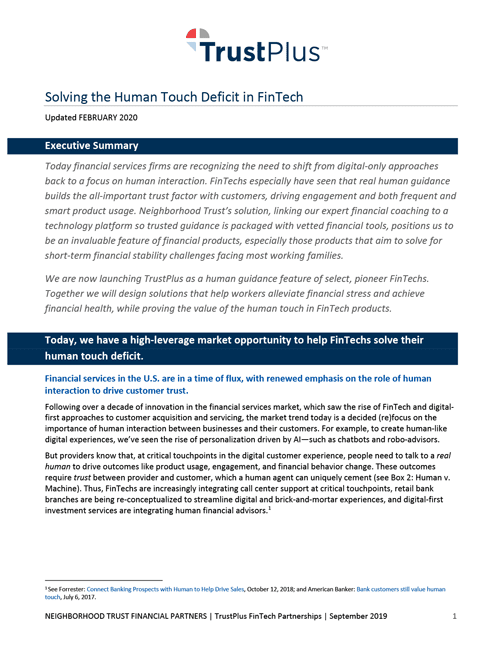
READ NEIGHBORHOOD TRUST’S WHITE PAPER: SOLVING THE HUMAN TOUCH DEFICIT IN FINTECH
Direct Cash Relief
Human Stories of the Coronavirus Pandemic
Neighborhood Trust recently partnered with SaverLife to distribute $1,000 checks generously funded by Humanity Forward to Bronx residents financially impacted by the coronavirus.
Our clients are among the hardest hit financially by the coronavirus pandemic, the hardest to reach, and most likely to be unsupported by the government’s relief efforts. They are small business owners, gig workers, and healthcare workers. They are immigrants, documented and undocumented. They are working parents who unexpectedly have to pay for childcare now that school is closed. They are children who now have to support parents who are out of work. They are overloaded by credit card and student loan debt and wondering how they’re going to pay their rent. They are weary of a financial system that has taken advantage of them far too many times.
The $1,000 our clients received has been a lifeline for so many, a sign of hope when things were bleak.
Direct Cash Relief
The Role of Human Touch in Emergency Cash Relief
In March 2020, as the U.S. realized the severity of the coronavirus pandemic and prepared for an economic shut down, Neighborhood Trust Financial Partners and SaverLife—two nonprofit FinTechs dedicated to financial security and inclusion for working families typically left out of the financial system—anticipated the devastating impact the financing crisis would have on low-to-moderate income families.
Given our existing partnership and a shared belief in combining mission with technology, Neighborhood Trust and SaverLife brought together our complementary strengths. Neighborhood Trust utilized its TrustPlus financial coaching to help workers navigate financial shocks and link them to smart financial tools and products. SaverLife leveraged its tech infrastructure to turn a savings platform into a cash distribution platform, deploying this same technology to send money straight to those who need it. Together, we launched an emergency cash relief and coaching effort to disburse money quickly and to help recipients build and pursue a financial plan.
The resulting collaboration on program and user experience design, recruitment of vulnerable families, onboarding support, cash disbursement, and financial coaching to help cash recipients make a financial plan was an extensive effort that came together in just a few weeks.
RE-IMAGINING THE WORKPLACE AS A HUB FOR FINANCIAL WELLNESS
A New Vision to Leverage HR Processes to Improve Employees’ Financial Health
Financial concerns are Americans’ number one source of stress. Employers have woken up to this reality in recent years, and more companies are investing in HR benefits that aim to improve employees’ financial wellness.


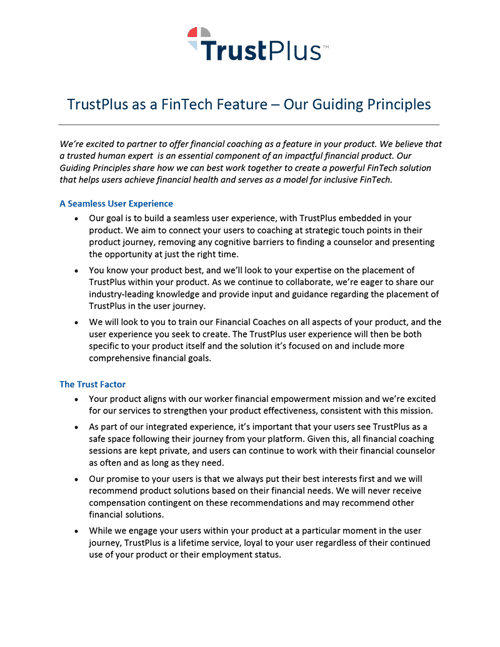
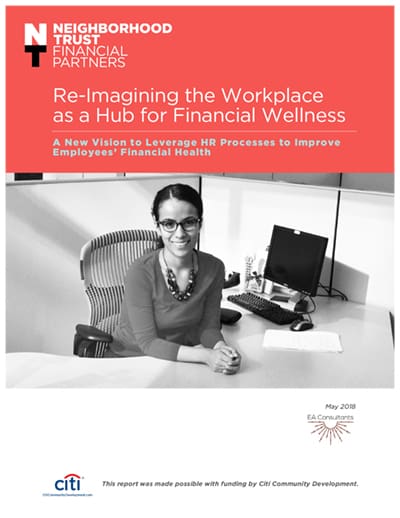
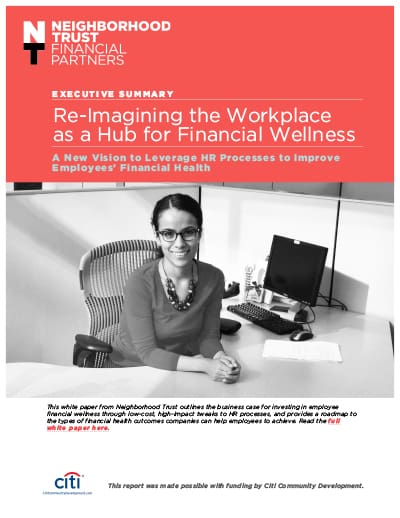
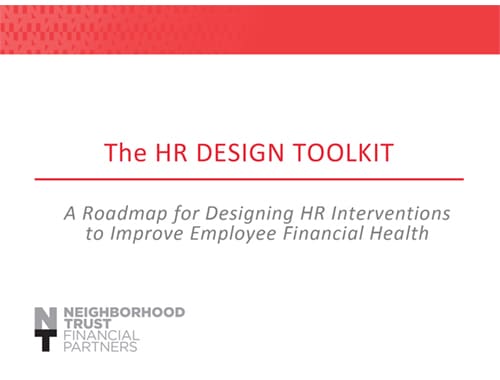



Follow Us